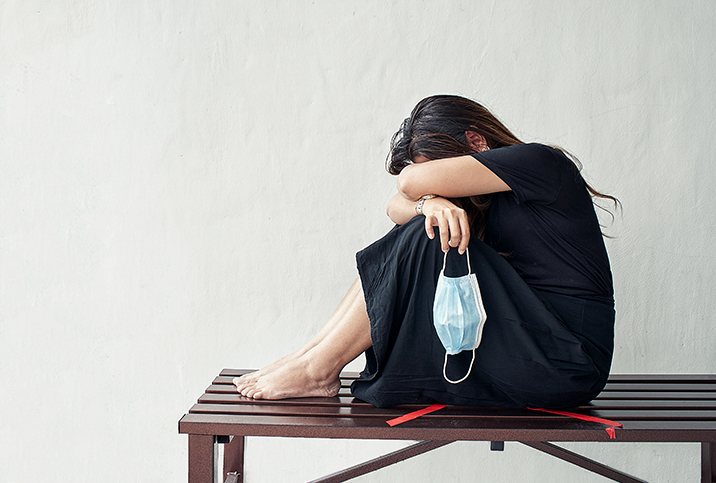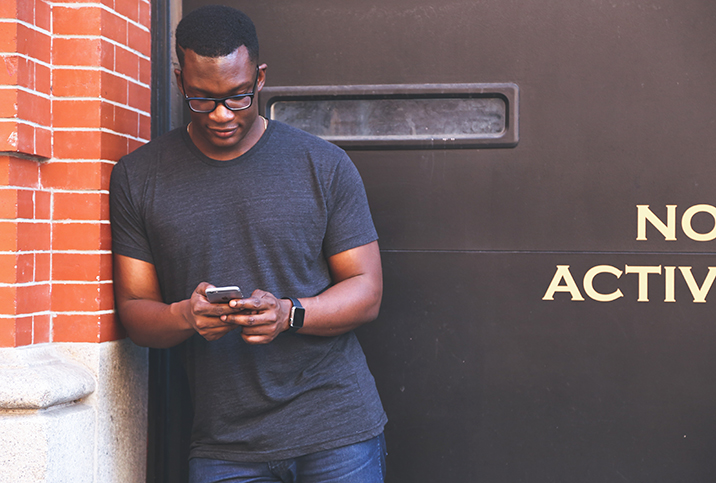How a Global Pandemic Has Affected Our Collective Anxiety

To call this past year an emotional roller coaster is like saying the Titanic's maiden voyage was a bumpy ride. As the COVID-19 virus spread across the world, people weathered enforced lockdowns, isolation from friends and family, the fear and reality of mass layoffs and financial instability, and the loss of loved ones. And (yes, even in the cases where people survived mostly unscathed) it wreaked havoc on their emotional and mental health.
A full one-fifth of American adults are currently experiencing high levels of psychological distress, found a February 2021 survey conducted by the Pew Research Center. And it's not just that fear and worry are living rent-free in their heads; 17 percent of respondents reported having physical reactions—think sweating, trouble breathing, nausea or a pounding heart—when thinking about the coronavirus outbreak, the researchers noted.
Anxiety disorders were the most common mental illness in the United States before the global pandemic upended normal life. But in February 2021, about 4 in 10 U.S. adults reported experiencing symptoms of anxiety or depressive disorder during the pandemic, according to the Kaiser Family Foundation, a nonprofit organization focusing on national health issues. That figure is up from 1 in 10 adults who reported these same symptoms from January to June 2019, according to the National Center for Health Statistics.
Fight or flight
What's causing all this anxiety? The pandemic has touched every aspect of people's lives, taking away any sense of control and putting everyone on edge. It also doesn't help that the country is simultaneously dealing with major political divisions and racial reckonings.
Physiologically, your body can only handle being in that heightened state of stress or arousal—aka the "fight or flight" response—for so long. Perceived dangers, or even a suggestion of danger, trigger a quick burst of energy so you can respond; if that danger doesn't dissipate, your body starts dumping the energy-promoting stress hormone cortisol into your system, forcing your body to stay on high alert.
Eventually, that excess cortisol will have the opposite effect, making you feel tired and burned out. And research has shown that long-term exposure to stress can cause a multitude of health issues, from an increased risk of anxiety, depression and disrupted sleep to a weakened immune system and heart disease, as well as hamper your sex drive (ironic given that getting it on releases hormones that can help get you out of a rut).
With the vaccine (finally!) rolling out across the U.S.—allowing states to loosen quarantine restrictions—you should feel some relief. But it's OK if you don't feel like you're back to normal (even if everyone on your social media feeds is ditching their masks, dining indoors and jetting off to Tulum). There will likely be long-lasting mental health ramifications stemming from the pandemic.
How to cope with 'doom'
What you can do right now is start to employ better habits that will help keep COVID-related anxiety from getting worse. For starters, unplug when you can. Doomscrolling—or voraciously consuming upsetting news and media—makes you more likely to experience symptoms of high acute stress, according to a 2014 survey following the Boston Marathon bombings.
And even though fears and anxieties around the pandemic are keeping more people up at night than ever before—37 percent of people reported taking longer to fall asleep between January and May 2020 in a survey conducted by the sleep-tracking app Sleep Cycle—it's more important than ever to prioritize shut-eye. Small losses in total sleep time led to increases in next-day anxiety, 2019 research in the journal Nature Human Behaviour found.
Don't eat your feelings to cope, either. There's a strong link between a bad diet and mood disorders like anxiety, 2019 research in the journal European Neuropsychopharmacology discovered. Poor nutrition also compromises your immune system, making your body less able to fight off infectious agents, and less likely to respond positively to vaccinations. A healthy diet is going to support your immune system, helping you avoid getting sick and stressing unnecessarily.
It's deflating to feel like you're not in control. But staying on top of the things you can control will help you feel more prepared to handle any ups and downs the rest of this pandemic may throw your way.


















